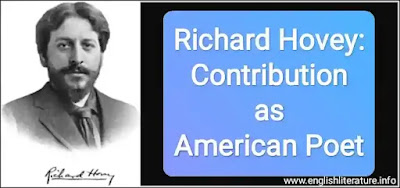Also Read
The most vigorous and enduring of the new group was Richard Hovey (1864–1900). He was Western-born schooled at Washington, and a graduate of Dartmouth in 1885. His next years included study in the General Theological Seminary in New York, an assistantship in a New York ritualistic church, excursions into journalism and acting, and then, after some years as poet and dramatist, a professorship of English literature in Barnard College, Columbia University. Hovey grew perceptibly during his eager enjoyment of these various pursuits. For a while he seemed content to sing the praises of convivial comradeship:
For we know the world is gloriousAnd the goal a golden thing,And that God is not censoriousWhen his children have their fling;
But he passed before long to the stage in which the good fellowship of youth was a symbol of something far larger than itself—nothing less than the promise of humankind. The ode delivered before his fraternity convention in 1896 quite transcends the sort of effusion usually evoked by such occasions. The spring in the air, in the world, and in the heart of youth culminate in the oft-sung “Stein Song”; and after it the poem goes on to “The first low stirring of that greater spring,”
Of something potent burning through the earth,Of something vital in the procreant air.
This potent something is the “unceasing purpose” of Tennyson, but with a difference, for in Hovey’s mind it is not the purpose of a detached God who imposes his will benevolently on mankind from without, but the creative impulse which is inherent in life itself, the evidence of the divine spirit in the heart of man. Comradeship, then, became to Hovey a symbol of altruism, and he looked beyond this springtide of the year and of the youthful collegians to the time when science, art, and religion should emancipate men in the truth that should set them free and bring them, in spite of delays, in the fullness of time to “the greater to-morrow.”
Yet while Hovey was uplifted by the fine fervor of such a faith, he experienced a reaction with the outbreak of the Spanish-American War. In the sudden self-righteousness of an inflamed patriotism he nationalized God and deified war. Excited beyond measure by the immediate issue, he not only justified America against Spain but, forgetting all the lessons of evolution, he declared that the race could develop only through the repetition of old experiences.
By strife as well as loving—strife,The Law of Life—In brute and man the climbing has been doneAnd shall be done hereafter. Since man wasNo upward-climbing causeWithout the sword has ever yet been won.
His mistake lay in justifying all wars in order to justify the national altruism of the war with Spain, and his fallacy came in his assumption that biological and physical life were governed by the same laws. For the moment Hovey turned “jingo,” as most of his countrymen did, yet even then he invoked the sword for the suppression of tyranny and not in the name of nationalistic ambition.
The home of Hovey’s imagination was where the true poet’s always is—“far in the vast of sky, … too high for sound of strife, or any violation of the town.” From this high vantage point he sang the glories of the things he loved the best, but with maturity he moved from the world of material pleasure to the realms of spiritual adventure. In 1893 he wrote:
Down the world with Marna!That’s the life for me!Wandering with the wandering wind,Vagabond and unconfined!
Five years later he could no longer catalogue his places on the map, for his goal was “the unknown” and “the wilderness” in pursuit of the high human adventure which Moody was to celebrate in his “Road Hymn for the Start.” In a parallel way Hovey’s first conception of fellowship rose from the early relish for beer and song to the fellowship of kindred souls of which the fine flowering is the love of man and woman.
Spirit to spirit finds its voiceless way,As tone melts meeting in accordant tone—Oh, then our souls, far in the vast of sky,Look from a tower, too high for sound of strifeOr any violation of the town,Where the great vacant winds of God go by,And over the huge misshapen city of lifeLove pours his silence and his moonlight down.
At the age of thirty-six, just on the threshold of maturity, Hovey died.
